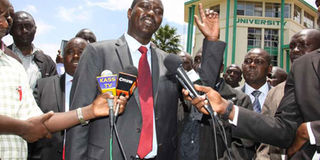Politicians have no role in university recruitment

Uasin Gishu Governor Jackson Mandago and other leaders at a meeting with workers at Moi University in Eldoret on September 20, 2016. The leaders vowed to disrupt the institution’s graduation slated for September 22 and 25 unless Prof Isaac Kosgey was appointed the institution's vice-chancellor and demanded that all casual workers be employed on a permanent basis. PHOTO | JARED NYATAYA | NATION MEDIA GROUP
What you need to know:
- Universities must research and publish and maintain high standards and quality.
- They and the and government must chart for Kenyans the best course to unity in diversity and their role in it.
A rumpus rolled over Kenya after a rowdy invasion of the main campus of Moi University on Tuesday by a band of agitated local politicians accompanied by a gaggle of supporters.
The group marched into the Eldoret-based university to protest the appointment of a temporary vice-chancellor by Education Cabinet Secretary Fred Matiang’i pending the recruitment of a substantive one in three months’ time.
The politicians had a blunt message for Dr Matiang’i and disbelieving Kenyans: The VC of Moi University, even in an acting capacity, shall be a Kalenjin. Therefore, the non-Kalenjin don the CS had appointed the previous day was not welcome. Several challenges shot forcefully to the fore. One, the politicians, who are Deputy President William Ruto’s surrogates, were basically asking why, if all top local national and county government appointments are reserved for locals, the VC’s slot should be different.
That, in turn, raised troubling questions about the future of the popular but fledgling devolution project and how it should dovetail into Kenya’s pursuit of the unity of its 40 plus tribes.
The demand for a local VC also cast a dark pall on government’s policy of sharing out public jobs among two communities that voted for the governing coalition of parties. And, the picket ominously reminded Kenyans that Uasin Gishu, whose capital Eldoret is, was the epicentre of the bloody politically-instigated post-election mayhem of 2007 and 2008. Indeed, the march on the university looked eerily like a sneak preview of a looming pre- or post-election blunder.
MOSTLY LOCALS
Two, even as Kenyans berated the politicians for turning Moi University into a tribal ghetto, it emerged that most public universities are led, and their staff peopled, by mostly locals. They are, therefore, seen as tribal and not national assets.
That’s profoundly disturbing. Firstly, when universities hire majority people who speak one tongue, then, they forfeit their place as drivers of diversity of thought, unity in diversity and development of a national consciousness and culture. Note this: The March advert for the hire of Moi University’s vice-chancellor featured this as its first core competence: “Ability to portray and uphold positive national image and work in a multi-cultural and multi-ethnic environment with sensitivity and respect for diversity”.
Secondly, a policy of hiring local people could result in qualified and competent non-locals being passed over in recruitment, placement and promotion. If the quality of teaching and administrative staff is compromised, then the quality of academic standards, too, stands compromised. Universities, then, cease to be centres of excellence.
Three, a furious debate raged, especially on social media, as to whether Prof Laban Ayiro qualified to be a professor let alone the acting deputy vice-chancellor he was and now acting vice-chancellor.
Last May, the same debate raged in this newspaper and its sister titles about what makes one a professor.
‘TRACK RECORD’
The aforesaid advert required, inter alia, that the applicant “have a proven track record of research as evidenced by publications in peer reviewed journals, monographs and books”. A growing body of critics is persuaded that many who hold the title of professor do not have enough publications to their credit to merit the title.
Four, how fair is the process of appointing a vice-chancellor? The vacancy is advertised and interviews carried out by the respective University Council. The council shortlists and forwards three to four names, complete with minutes of each interview meeting, to the CS.
Was this procedure followed? Yes. Was it flouted? Without proffering any evidence, the politicians charged that Prof Isaac Kosgei, who they claimed topped the shortlist, was unfairly disqualified. Poisoned, campaigners wrongly barracked Dr Matiang’i for giving majority vice-chancellor jobs to his Abagusii tribespeople.
Indeed, the politicians seemed unaware that on getting the shortlists, the CS consults intelligence for a security brief on each applicant before making his choice and informing State House. The president did not interfere in the Eldoret process.
So here’s my wrap. One, politicians have no role in university recruitment.
Two, recruitment must not turn universities into tribal enclaves.
Three, universities must research and publish and maintain high standards and quality.
Last, universities and the government must chart for Kenyans the best course to unity in diversity and their role in it.





